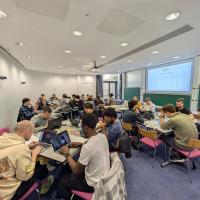
Brainstorming AI with Maths4DL
The capabilities of artificial intelligence may appear to be galloping ahead, but there are still many challenges that need to be solved. Last month we joined members of the Maths4DL research project for a hackathon — an intensive two-day brainstorming session designed to figure out how one might teach machine learning techniques for solving differential equations and how best to test those techniques.
In this episode of Maths on the Move, Maths4DL members Yolanne Lee from University College London, Georg Maierhofer from the University of Cambridge, and Chris Budd OBE from the University of Bath tell us all about the hackathon, the science behind it, and what it was like to participate in those ambitious but exciting 48 hours.
For a brief introduction to machine learning see Maths in a minute: Machine learning and neural networks and for a brief introduction to differential equations see Maths in a minute: Differential equations. You might also like:
- Our podcast featuring Yolanne Lee talking about her work as a Maths4DL researcher,
- Our podcast featuring Georg Maierhofer talking about physics informed neural networks, as well as the accompanying article,
- Our article AI and GoPro physics featuring the work of Nathan Kutz who is mentioned in this podcast.
This content is part of our collaboration with the Mathematics for Deep Learning (Maths4DL) research programme, which brings together researchers from the universities of Bath and Cambridge, and University College London. Maths4DL aims to combine theory, modelling, data and computation to unlock the next generation of deep learning. You can see more content produced with Maths4DL here.
